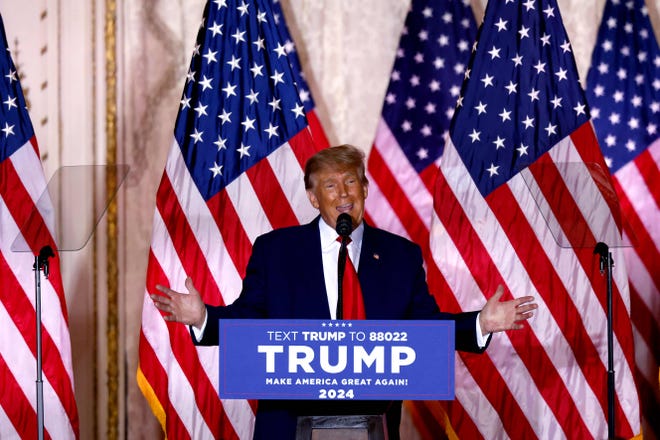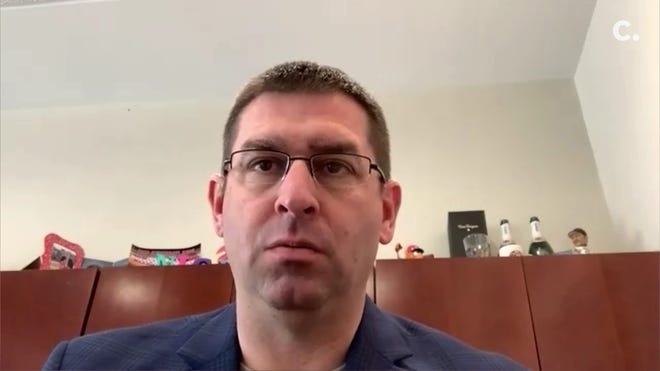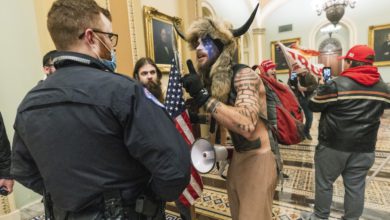
Facebook parent company Meta Platforms says it will reinstate Donald Trump's accounts on Facebook and Instagram in coming weeks.
Despite opposition from Democrats and advocacy groups, the company said it would lift the ex-president’s suspension as he makes another run for the White House.
Trump has not been allowed to post on Facebook and Instagram since his accounts were indefinitely shut down following the January 6, 2021 attack on the Capitol.
At the time, Facebook said the ban was indefinite. After its outside board weighed in, the company banned Trump for two years and said it would decide this month whether to lift the suspension.
Trump reacts to Facebook return on Truth Social
Trump responded to Facebook's decision on his Truth Social account.
"FACEBOOK, which has lost Billions of Dollars in value since 'deplatforming' your favorite President, me, has just announced that they are reinstating my account," he wrote. "Such a thing should never again happen to a sitting President, or anybody else who is not deserving of retribution!"
He has events scheduled for Saturday in New Hampshire and South Carolina. Trump and his allies made extensive use of Facebook in his previous presidential runs.
Facebook says Trump will have to play by the rules. The company can restrict the accounts of public figures who violate its community standards during periods of civil unrest and Trump will face stiffer penalties in the future, said Nick Clegg, president of global affairs for Facebook parent company Meta.
"In the event that Mr. Trump posts further violating content, the content will be removed and he will be suspended for between one month and two years, depending on the severity of the violation," Clegg said in a blog post.
Trump could also face restrictions for content that does not violate Facebook's rules but "contributes to the sort of risk that materialized on January 6th, such as content that delegitimizes an upcoming election or is related to QAnon," Clegg said.
In those cases, Facebook could limit how widely Trump's posts are viewed or temporarily restrict access to Facebook's advertising tools.
Trump's return dismays Democrats, civil rights groups
"We know that any decision we make on this issue will be fiercely criticized. Reasonable people will disagree over whether it is the right decision," Clegg said.
Two Democratic lawmakers sent a letter to Meta last month urging the company not to reinstate Trump on its platforms, arguing that his continued lies about the 2020 election are an attack on American democracy.
Opponents of Trump criticized the decision, saying it gives Trump more avenues to spread lies and disinformation. Trump, who frequently spreads misinformation online, has continued to falsely claim the 2020 election was stolen.
"Trump incited an insurrection," tweeted U.S. Rep. Adam Schiff, D-Calif. "And tried to stop the peaceful transfer of power. He’s shown no remorse. No contrition. Giving him back access to a social media platform to spread his lies and demagoguery is dangerous."
A Jan. 6 Committee report found that Trump’s supporters used Facebook to track his claims of a stolen election and that Facebook’s “delayed response" to far-right extremism and Trump's incitement "helped to facilitate the attack on January 6th.”
“Mark Zuckerberg’s decision to reinstate Trump’s accounts is a prime example of putting profits above people's safety," NAACP President Derrick Johnson, said in a statement. "It’s quite astonishing that one can spew hatred, fuel conspiracies, and incite a violent insurrection at our nation's Capitol building, and Mark Zuckerberg still believes that is not enough to remove someone from his platforms."
Most conservatives cheer Trump's reinstatement on Facebook
Conservatives say the ban is free-speech censorship by left-leaning technology executives that could unfairly hobble Trump in his presidential bid.
Trump's campaign petitioned Meta to unblock his Facebook and Instagram accounts that were locked after the Capitol attack.
A continued ban would constitute "a deliberate effort by a private company to silence Mr. Trump’s political voice," Trump’s campaign wrote to Meta on Tuesday, according to a copy reviewed by USA TODAY.
Tom Fitton, president of Judicial Watch, a conservative-leaning group, objected to Facebook's new rules for Trump. Trump will face "abusive restrictions on his speech obviously designed to help Left, Democrats and Joe Biden in the run-up to the presidential election," Fitton tweeted.
Not all conservatives applauded Facebook's decision.
Michael Steele, former Republican Party chairman, said social media companies can do what they want, but warned there would be fallout from reinstating Trump.
"Private company. Private platform. Their decision," Steele tweeted. "But we know the behavior hasn’t changed and the lies continue reinforced by feckless political figures who just want Trump to like them. Whether it’s Twitter or Facebook, there are consequences."
Will Trump post again on Facebook?
It's unclear if Trump will make use of Facebook as he seeks the Republican nomination. Trump has not tweeted since Twitter owner Elon Musk lifted his ban in November.
"Sadly, Facebook has been doing very poorly since they took me off," Trump said in a statement earlier this month, suggesting parent company Meta Platforms revert to calling itself Facebook. "Whoever made that decision, and the decision to take me off, will go down in the Business Hall of Fame for two of the worst decisions in Business History!"
Facebook could help Trump raise campaign money
Returning to Facebook could turbocharge Trump's political outreach and fundraising in the 2024 presidential race. In 2016 and in 2020, Trump tapped Facebook to energize his base and raise campaign cash.
Trump has 34 million followers on Facebook and 23 million on Instagram.
Despite the ban, “Team Trump,” a Facebook page managed by his political organization, remained active and has 2.3 million followers.
Trump ban on Facebook outraged conservatives
Meta Platforms cut off Trump’s access to its platforms indefinitely following the Capitol attacks. Trump critics praised the move, which had the support of most Americans but free speech advocates warned it set a dangerous precedent.
The de-platforming enraged conservatives who've complained for years that social media platforms target them based on their political beliefs and have too much latitude to restrict or remove content.

Those grievances boiled over when Facebook, Twitter and YouTube suspended Trump’s accounts, citing the risk that he would use his social media megaphones to incite more violence before the end of his term.
In response, Florida and Texas passed laws banning social media giants like Facebook from moderating content. Those laws are being challenged in the courts.
The Trump bans also renewed criticism of Section 230, a provision of federal law that shields internet companies from liability for user-generated content. Trump and other conservatives have argued for years that the provision should be repealed.
Why Trump was banned from Facebook
Meta Platforms CEO Mark Zuckerberg accused Trump of trying "to undermine the peaceful and lawful transition of power to his elected successor, Joe Biden" and said the indefinite suspension the day after Trump supporters stormed the Capitol was necessary to reduce the risk of violence at least up until Biden's inauguration.
The company referred the final decision on Trump's indefinite suspension to its Oversight Board. Saying Trump's suspension had drawn "intense global interest," the board accepted the case and pledged to conduct "a thorough and independent assessment of the company’s decision.”
Facebook Oversight Board upheld Trump suspension
The Facebook Oversight Board upheld Trump's suspension in May 2021.
The Oversight Board found that the two Trump posts on Jan. 6 "severely violated Facebook’s Community Standards and Instagram’s Community Guidelines" prohibiting praise or support of people engaged in violence.
Specifically, Trump crossed the line when he wrote “We love you. You’re very special” and when he called the rioters “great patriots” and told them to “remember this day forever.”
"At the time of Mr. Trump’s posts, there was a clear, immediate risk of harm and his words of support for those involved in the riots legitimized their violent actions," the board found. "As president, Mr. Trump had a high level of influence. The reach of his posts was large, with 35 million followers on Facebook and 24 million on Instagram."
Facebook originally banned Trump for two years
But the company-funded tribunal of outside experts also ruled that it was inappropriate for Facebook to impose an indefinite suspension and instructed the company to review it.
In June 2021, Facebook decided to ban Trump for two years. After that period, Facebook said it would consult experts to determine whether "the risk to public safety has receded."
At the time, Facebook said Trump's Facebook and Instagram accounts would face a "strict set of rapidly escalating sanctions” if he violates the company's rules again.
"Today’s decision by Meta is a pivotal moment in the debate over the best way to handle harmful content posted by politicians on social media," the Oversight Board said in a statement Wednesday.
Is Trump still banned on Twitter and YouTube?
Trump called Facebook, Twitter and Google's YouTube, all of which suspended him after his supporters attacked the Capitol, "a total disgrace and an embarrassment to our country."
Twitter permanently barred Trump after the Capitol attacks. Musk reinstated Trump’s account and his nearly 88 million followers late last year.
CEO Susan Wojcicki said in 2021 that YouTube would lift the Trump ban “when we determine the risk of violence has decreased.” YouTube declined to comment.
What about Trump and Truth Social?
Without his mainstream social media megaphones, Trump has relied on his Truth Social app which has a more limited reach.
The ex-president has contractual obligations to his TruthSocial app and must post first there, with some exceptions including posts from a personal account for some political activities.
He also has incentive to prop up the value of his social media company.
In November, shareholders in the blank-check acquisition company Digital World Acquisition that plans to merge with Trump Media & Technology Group approved a one-year extension to close the deal. Regulators are investigating whether the leadership of Digital World and Trump Media engaged in negotiations before Digital World went public in 2021.
Contributing: David Jackson








